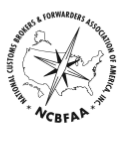
D
D.F.: Dead Freight
d.w.: Deadweight (tons of 2,240 lbs.)
d.w.c.: Deadweight for cargo
D/O: Delivery order
DAF: Delivered At Frontier - One of the thirteen Incoterms and one of five 'D' terms.
- The seller is obliged to deliver the goods at the frontier before the customs border of the adjoining contry. The goods should be made available and cleared for export. The seller must also provide documents to enable the buyer to take delivery such as the document of transport or warehouse warrant.
Dangerous Goods: Articles or substance capable of posing a significant risk to health, safety or property, and that ordinarily require special attention when being transported.
DAT: Dangerous articles tariff.
Date Draft: Draft that matures in a specified number of days after the date it is issued, without regard to the date of Acceptance. See Draft.
DCA: Department of Civil Aviation. Commonly used term to denote the government department of any foreign country that is responsible for aviation regulation and granting traffic rights.
DDP: Delivered duty paid. Also known as "free domicile."
DDU: Delivered duty unpaid. Reflects the emergence of "door-to-door" intermodal or courier contracts or carriage where only the destination customs duty and taxes (if any) are paid by consignee.
Dead Freight: Is freight charges paid by the charterer of vessel for the contracted space, which is left partially unoccupied.
Dead Leg: Is a sector flown without payload.
Deck Cargo: Is cargo carried on deck rather than stowed under deck. On deck carriage is required for certain commodities, such as explosives.
Deferred Payment Credit: Type of letter of credit providing for payment some time after presentation of shipping documents by exporter.
Deferred Rebate: The return of a portion of the freight charges by a carrier or a conference shipper in exchange for the shipper giving all or most of his shipments to the carrier or conference over a specified period of time (usually 6 months). Payment of the rate is deferred for a further similar period, during which the shipper must continue to give all or most of his shipments to the rebating carrier or conference. The shipper thus earns a further rebate which will not, however, be paid without an additional period of exclusive or almost exclusive patronage with the carrier of conference. In this way, the shipper becomes tied to the rebating carrier or conference. Although, the deferred rebate system is illegal in U.S. foreign commerce, it generally is accepted in the ocean trade between foreign countries.
Demurrage: A penalty for exceeding free time allowed for loading or unloading at a pier or freight terminal. Also a charge for undue detention of transportation equipment or carriers in port while loading or unloading.
Density: Density means pounds per cubic foot. The cubage of loose articles or pieces, or packaged articles of a rectangular, elliptical or square shape on one plane shall be determined by multiplying the greatest straight line dimensions of length, width and depth in inches, including all projections, and dividing the total by 1728 (to obtain cubic feet). The density is the weight of the article divided by the cubic feet thus obtained.
DEQ: Delivered Ex Quay (Duty Paid) - One of the thirteen Incoterms and one of five 'D' terms.
- The seller is obliged to deliver the goods on the quay at the port of destination, cleared for importation. The seller must pay unloading costs and provide import clearance such as import licences, pay duties, taxes and fees. The buyer simply takes delivery of the goods.
DES: Delivered Ex Ship - One of the thirteen Incoterms and one of five 'D' terms.
- The seller is obliged to deliver the goods on board the ship at the port of destination, uncleared for importation.
- The seller must provide documents to enable the buyer to take delivery of the goods ie the bill of lading.
- The buyer must pay unloading costs and provide import clearance ie duties, taxes & fees.
Destination Control Statement: Any of various statements that the U.S. government requires to be displayed on export shipments and that specify the destination for which export of the shipment has been authorized.
DGN: Dangerous Goods Note
DGR: Dangerous Goods Requirement.
Dim Weight: (Dimensionalized Weight) Determined by calculating length x width x height and dividing by 166. Charged when actual weight is less than the dim. weight.
Disbursement: Sums paid out by a ship’s agent at a port on behalf of the owner.
Discharging: Removing goods from a ship.
Dock Receipt: When cargo is delivered to a steamship company at the pier, the receiving clerk issues a dock receipt.
Documents Against Acceptance (D/A): Instructions given by a shipper to a bank indicating that documents transferring title goods should be delivered to the buyer (or drawee) only upon the buyer's acceptance of the attached draft.
DOT: Department of Transportation
Draft (or Bill of Exchange): An unconditional order in writing from one person (the drawer) to another (the drawee), directing the Drawee to pay a specified amount to a named Drawer at a fixed or determinable future date.
Draft: Widely used alternative spelling of draught. Depth to which a ship is immersed in the water. This depth varies according to the design of the ship and will be greater or lesser depending not only on the weight of the ship and everything on board, but also on the density of the water in which the ship is lying.
Drawback: A U.S. customs law that permits an American exporter to recover duties paid on imported foreign raw materials or components included in products that are subsequently exported out of the United States.
Drawee: The individual or firm on whom a draft is drawn and who owes the stated amount to the drawer.
Dry Lease: The rental of a "clean" aircraft without crew, ground staff or supporting equipment.
Dry Van: A basic 20/40ft container.
DST: The acronym meaning "double stack train" service, which is the transport rail between two points of a trainload of containers with two containers, one on top of the other, per chassis.
DTI: Department of Trade and Industry
Dunnage: Materials of various types, often timber or matting, placed among the cargo for separation, and hence protection from damage, for ventilation and, in the case of certain cargoes, to provide a space in which the tynes of a forklift truck may be inserted.
DWT: Deadweight: Weight of cargo, stores and water, i.e. the difference between lightship and loaded displacement.























